经典幼儿英语短文带翻译:这是不公平
- 格式:docx
- 大小:7.06 MB
- 文档页数:3
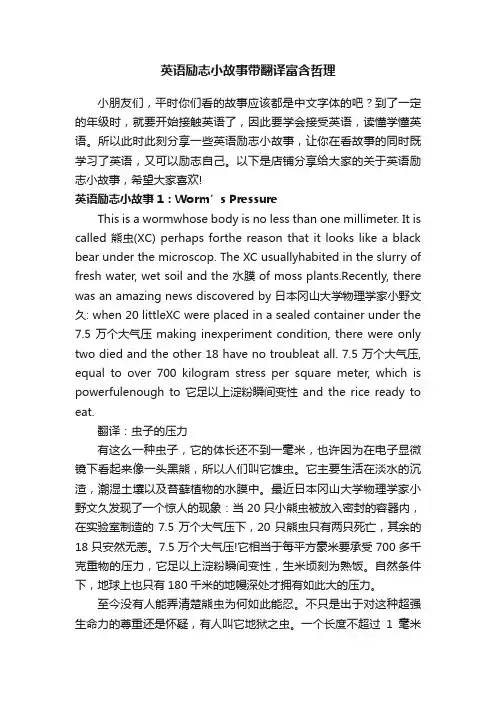
英语励志小故事带翻译富含哲理小朋友们,平时你们看的故事应该都是中文字体的吧?到了一定的年级时,就要开始接触英语了,因此要学会接受英语,读懂学懂英语。
所以此时此刻分享一些英语励志小故事,让你在看故事的同时既学习了英语,又可以励志自己。
以下是店铺分享给大家的关于英语励志小故事,希望大家喜欢!英语励志小故事1:Worm’s PressureThis is a wormwhose body is no less than one millimeter. It is called 熊虫(XC) perhaps forthe reason that it looks like a black bear under the microscop. The XC usuallyhabited in the slurry of fresh water, wet soil and the 水膜 of moss plants.Recently, there was an amazing news discovered by 日本冈山大学物理学家小野文久: when 20 littleXC were placed in a sealed container under the 7.5 万个大气压 making inexperiment condition, there were only two died and the other 18 have no troubleat all. 7.5 万个大气压, equal to over 700 kilogram stress per square meter, which is powerfulenough to它足以上淀粉瞬间变性and the rice ready to eat.翻译:虫子的压力有这么一种虫子,它的体长还不到一毫米,也许因为在电子显微镜下看起来像一头黑熊,所以人们叫它雄虫。
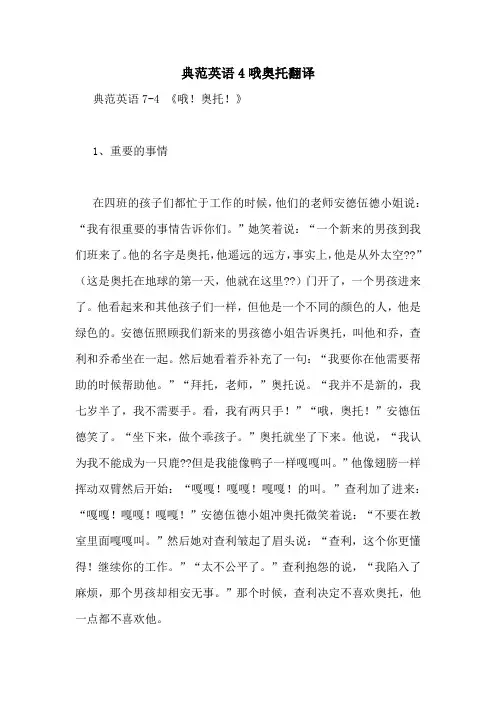
典范英语4哦奥托翻译典范英语7-4 《哦!奥托!》1、重要的事情在四班的孩子们都忙于工作的时候,他们的老师安德伍德小姐说:“我有很重要的事情告诉你们。
”她笑着说:“一个新来的男孩到我们班来了。
他的名字是奥托,他遥远的远方,事实上,他是从外太空??”(这是奥托在地球的第一天,他就在这里??)门开了,一个男孩进来了。
他看起来和其他孩子们一样,但他是一个不同的颜色的人,他是绿色的。
安德伍照顾我们新来的男孩德小姐告诉奥托,叫他和乔,查利和乔希坐在一起。
然后她看着乔补充了一句:“我要你在他需要帮助的时候帮助他。
”“拜托,老师,”奥托说。
“我并不是新的,我七岁半了,我不需要手。
看,我有两只手!”“哦,奥托!”安德伍德笑了。
“坐下来,做个乖孩子。
”奥托就坐了下来。
他说,“我认为我不能成为一只鹿??但是我能像鸭子一样嘎嘎叫。
”他像翅膀一样挥动双臂然后开始:“嘎嘎!嘎嘎!嘎嘎!的叫。
”查利加了进来:“嘎嘎!嘎嘎!嘎嘎!”安德伍德小姐冲奥托微笑着说:“不要在教室里面嘎嘎叫。
”然后她对查利皱起了眉头说:“查利,这个你更懂得!继续你的工作。
”“太不公平了。
”查利抱怨的说,“我陷入了麻烦,那个男孩却相安无事。
”那个时候,查利决定不喜欢奥托,他一点都不喜欢他。
2、查利生气奥托犯了很多错误。
查利靠在他的椅子上。
奥图试图做同样的事情。
但他跌倒了?使所有的颜料也倒了?。
现在查利也变成绿色的了,他变得越来越生气。
休息时间,在当奥托在操场上玩耍的时候,查利决定吓吓他。
他对奥托说:“如果你站在那里,你会被熊吃掉的。
”“熊!在哪儿?”奥托尖叫起来。
查利咯咯的笑说:“我们把熊放在了校长的办公室。
地球上所有的学校都有熊,”他接着说。
“有时候,熊出去了??有时候很饿!”奥托看上去很害怕。
3、寻宝下午班上举行一个寻宝游戏。
所有的孩子都期待着它。
安德伍德小姐给每对孩子同样的线索。
她对乔说:“我想你和奥托组成一组”。
奥托说:“在雪梨里面工作?怎么工作?它将必须是一个大梨,不要太多汁,我们都会很粘的。
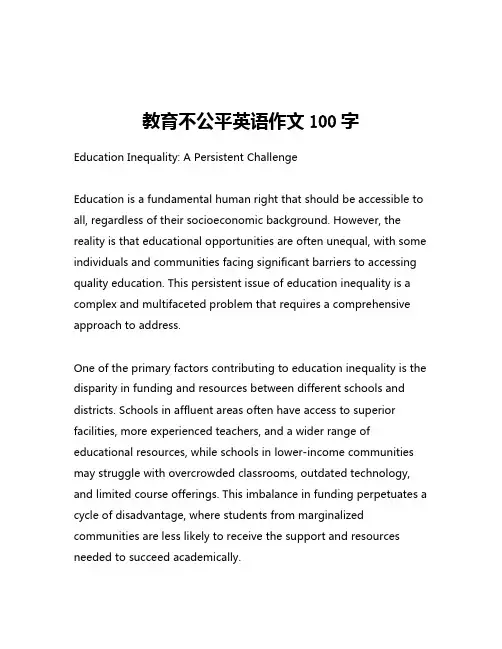
教育不公平英语作文100字Education Inequality: A Persistent ChallengeEducation is a fundamental human right that should be accessible to all, regardless of their socioeconomic background. However, the reality is that educational opportunities are often unequal, with some individuals and communities facing significant barriers to accessing quality education. This persistent issue of education inequality is a complex and multifaceted problem that requires a comprehensive approach to address.One of the primary factors contributing to education inequality is the disparity in funding and resources between different schools and districts. Schools in affluent areas often have access to superior facilities, more experienced teachers, and a wider range of educational resources, while schools in lower-income communities may struggle with overcrowded classrooms, outdated technology, and limited course offerings. This imbalance in funding perpetuates a cycle of disadvantage, where students from marginalized communities are less likely to receive the support and resources needed to succeed academically.Another significant factor is the impact of socioeconomic status on educational outcomes. Children from low-income families often face a range of challenges, such as limited access to healthcare, nutritious food, and stable housing, which can negatively impact their cognitive development and academic performance. Additionally, these students may have fewer opportunities to participate in extracurricular activities, which can play a crucial role in fostering well-rounded learning and personal growth.Racial and ethnic disparities are also deeply embedded within the education system. Students from minority backgrounds, particularly those from Black, Hispanic, and Indigenous communities, often face systemic barriers to educational attainment, including higher dropout rates, lower college enrollment, and disproportionate disciplinary measures. These disparities can be traced back to a long history of institutional racism and discriminatory policies that have excluded these communities from educational opportunities.Furthermore, gender-based inequalities in education remain a significant challenge. In many parts of the world, girls and young women face barriers to accessing education, such as cultural norms, early marriage, and gender-based violence. Even in countries with relatively high levels of gender parity in education, gender stereotypes and biases can still influence educational and career choices, limiting the opportunities available to individuals based ontheir gender.Addressing education inequality requires a multifaceted approach that tackles the root causes of the problem. This may involve increasing funding and resources for underfunded schools, implementing targeted programs to support students from disadvantaged backgrounds, addressing systemic biases and discrimination, and promoting inclusive and equitable learning environments.Governments, educational institutions, and civil society organizations all have a crucial role to play in addressing this issue. Effective policies and initiatives should focus on providing equal access to quality education, fostering inclusive and culturally responsive teaching practices, and empowering marginalized communities to advocate for their educational rights.Ultimately, achieving education equality is not only a matter of social justice but also a fundamental step towards creating a more equitable and inclusive society. By ensuring that all individuals have access to high-quality education, we can unlock their full potential, foster social mobility, and build a more just and prosperous future for all.。
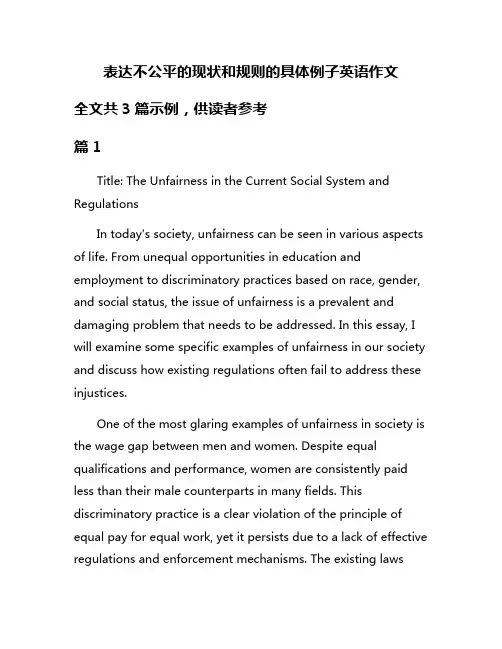
表达不公平的现状和规则的具体例子英语作文全文共3篇示例,供读者参考篇1Title: The Unfairness in the Current Social System and RegulationsIn today's society, unfairness can be seen in various aspects of life. From unequal opportunities in education and employment to discriminatory practices based on race, gender, and social status, the issue of unfairness is a prevalent and damaging problem that needs to be addressed. In this essay, I will examine some specific examples of unfairness in our society and discuss how existing regulations often fail to address these injustices.One of the most glaring examples of unfairness in society is the wage gap between men and women. Despite equal qualifications and performance, women are consistently paid less than their male counterparts in many fields. This discriminatory practice is a clear violation of the principle of equal pay for equal work, yet it persists due to a lack of effective regulations and enforcement mechanisms. The existing lawsagainst gender discrimination in the workplace are often inadequate or poorly enforced, leading to continued disparities in pay and opportunities for women.Another example of unfairness can be seen in the criminal justice system, where people of color are disproportionately targeted, arrested, and incarcerated compared to white individuals. This systemic racism has deep roots in our society and is perpetuated by biased regulations and practices within law enforcement and the legal system. Despite efforts to address these disparities, such as the implementation of body cameras and implicit bias training for police officers, the fundamental issues of racial discrimination and inequality remain largely unaddressed.Furthermore, unfairness can also be observed in the educational system, where students from disadvantaged backgrounds face greater obstacles to academic success. Inadequate funding for schools in low-income communities, unequal access to quality teachers and resources, and biased standardized testing practices all contribute to the perpetuation of educational inequities. Despite the existence of laws such as the Equal Educational Opportunities Act, which prohibits discrimination in education based on race, gender, or economicstatus, these regulations have not been effectively implemented to address the systemic barriers to educational equity.In addition to these examples, there are many other instances of unfairness in society, such as discriminatory housing practices, unequal access to healthcare, and environmental injustices that disproportionately affect marginalized communities. The root cause of these injustices lies in the deep-seated inequalities and biases that exist within our social structures and institutions. While regulations and laws are intended to protect against discrimination and promote fairness, they often fall short of addressing the complex and intersectional nature of societal injustices.To truly address the issue of unfairness in society, we must work towards implementing comprehensive and inclusive regulations that take into account the diverse lived experiences and needs of all individuals. This requires a proactive approach to identifying and dismantling systemic barriers to social justice, as well as a commitment to holding institutions and individuals accountable for their discriminatory practices. By working together to challenge and change the status quo, we can move towards a more equitable and just society for all.篇2Title: Unfairness in Society: Examples and RulesIntroductionIn every society, there are instances of unfairness that exist due to various factors such as social status, economic background, or discrimination. These inequalities can be seen in different aspects of life, including education, healthcare, employment, and justice. In this essay, we will explore examples of unfairness in society and discuss the rules that can help address these issues.Examples of Unfairness1. EducationOne of the most common examples of unfairness in society is the unequal access to quality education. In many countries, students from wealthy families have better opportunities for education, including access to private schools, tutors, and resources. On the other hand, students from low-income families often struggle to afford tuition fees, books, and other essentials necessary for learning. This disparity in educational opportunities can lead to a cycle of poverty and inequality that is difficult to break.2. HealthcareAnother area where unfairness is prevalent is in healthcare. People with higher incomes and better access to resources are more likely to receive timely medical care, quality treatments, and services. In contrast, individuals from marginalized communities or lower-income households may face barriers to healthcare, including long wait times, limited access to specialty care, and inadequate facilities. This disparity in healthcare can impact the well-being and longevity of individuals, leading to preventable illnesses and premature deaths.3. EmploymentUnfairness in the workplace is also a widespread issue that affects many individuals. Discrimination based on gender, race, age, or disability can limit job opportunities for qualified candidates and create a hostile work environment. Additionally, unequal pay and lack of promotion opportunities for marginalized groups can perpetuate inequalities in income and wealth. These challenges can prevent individuals from achieving their full potential and hinder their professional growth and development.4. JusticeThe justice system is another area where unfairness is often observed, particularly in cases of racial profiling, biasedsentencing, and unequal treatment under the law. People from minority groups are more likely to be targeted by law enforcement, receive harsher penalties for the same crimes, and experience discrimination in court proceedings. These injustices can erode trust in the legal system and perpetuate systemic racism and inequality in society.Rules to Address UnfairnessDespite the challenges of unfairness in society, there are rules and regulations that can help address these issues and promote equality and justice for all individuals. Some of the rules that can be implemented include:1. Equal Opportunity LawsEnforcing equal opportunity laws that prohibit discrimination in education, healthcare, employment, and other areas can help ensure that all individuals have access to the same opportunities and resources. These laws can protect individuals from unfair treatment based on their race, gender, age, or disability and promote a more inclusive and diverse society.2. Social Welfare ProgramsImplementing social welfare programs that provide assistance to low-income families, individuals with disabilities,and other vulnerable populations can help reduce inequalities in society. These programs can include affordable housing, healthcare, food assistance, and job training initiatives that support individuals in need and empower them to improve their quality of life.3. Diversity and Inclusion PoliciesPromoting diversity and inclusion in the workplace through policies that support hiring, promotion, and retention of individuals from diverse backgrounds can help create a more equitable and supportive work environment. These policies can help companies recruit top talent from diverse populations, foster innovation and creativity, and promote a culture of respect and acceptance.4. Legal ReformAdvocating for legal reform that addresses systemic injustices in the justice system, including racial profiling, biased sentencing, and inadequate legal representation, can help promote fairness and equality under the law. Reforming outdated laws and policies that perpetuate inequalities can help ensure that all individuals receive equal treatment and protection under the law.ConclusionIn conclusion, unfairness in society is a pervasive issue that affects individuals from all walks of life. By recognizing the examples of unfairness in education, healthcare, employment, and justice, and addressing these issues through rules and regulations that promote equality and justice for all individuals, we can create a more just and equitable society for future generations. It is up to each one of us to work together to challenge unfairness and advocate for a world where everyone has the opportunity to thrive and succeed.篇3The issue of unfairness is prevalent in society, whether it be in the form of discrimination, inequality, or biased rules and regulations. In many cases, these unfair practices can perpetuate systemic disadvantages that hinder the opportunities and rights of certain individuals or groups. This essay will explore the current state of unfairness and provide specific examples of unfair rules and regulations that contribute to this problem.One area where unfairness is commonly observed is in the workplace. Despite advancements in diversity and inclusion initiatives, discrimination based on race, gender, age, or otherfactors still persists. For example, in many industries, there is a gender pay gap where women are paid significantly less than their male counterparts for the same work. This disparity is not only unfair but also perpetuates the cycle of gender inequality in the workforce.Another example of unfairness can be seen in the education system. Students from low-income backgrounds often face barriers to accessing quality education and resources, which can impact their academic success and future opportunities. In some schools, funding is disproportionately allocated to wealthier neighborhoods, resulting in disparities in educational quality and opportunities for students based on their socioeconomic status.Unfair rules and regulations also play a role in perpetuating inequality. For instance, in some countries, there are discriminatory laws that restrict the rights of certain marginalized groups, such as the LGBTQ+ community. These laws can prevent individuals from fully participating in society and accessing essential services, leading to further marginalization and discrimination.Furthermore, unfair rules and regulations can also impact marginalized communities in other ways. For example, in the criminal justice system, there are disparities in sentencing andtreatment based on race and socioeconomic status. Studies have shown that minority individuals are more likely to be arrested, charged, and sentenced to harsher penalties compared to their white counterparts for the same offenses. This systemic bias perpetuates racial inequalities and contributes to the overrepresentation of minorities in the criminal justice system.In conclusion, the prevalence of unfairness in society is a significant issue that continues to impact individuals and communities across various sectors. By highlighting specific examples of unfair rules and regulations, such as discrimination in the workplace, disparities in education, and biases in the criminal justice system, it is evident that there is a dire need for systemic change to address these inequalities. It is crucial for policymakers, institutions, and individuals to work towards creating a more just and equitable society where everyone has equal opportunities and rights. Only through collective effort and a commitment to fairness can we dismantle the barriers that perpetuate unfairness and create a more inclusive and equitable world for all.。
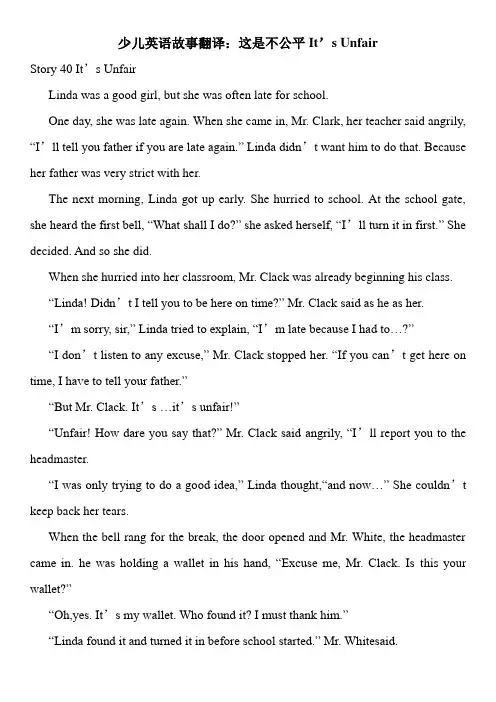
少儿英语故事翻译:这是不公平It’s UnfairStory 40 It’s UnfairLinda was a good girl, but she was often late for school.One day, she was late again. When she came in, Mr. Clark, her teacher said angrily, “I’ll tell you father if you are late again.” Linda didn’t want him to do that. Because her father was very strict with her.The next morning, Linda got up early. She hurried to school. At the school gate, she heard the first bell, “What shall I do?” she asked herself, “I’ll turn it in first.” She decided. And so she did.When she hurried into her classroom, Mr. Clack was already beginning his class.“Linda! Didn’t I tell you to be here on time?” Mr. Clack said as he as her.“I’m sorry, sir,” Linda tried to explain, “I’m late because I had to…?”“I don’t listen to any excuse,” Mr. Clack stopped her. “If you can’t get here on time, I have to tell your father.”“But Mr. Clack. It’s …it’s unfair!”“Unfair! How dare you say that?” Mr. Clack said angrily, “I’ll report you to the headmaster.“I was only trying to do a good idea,” Linda thought,“and now…” She couldn’t keep back her tears.When the bell rang for the break, the door opened and Mr. White, the headmaster came in. he was holding a wallet in his hand, “Excuse me, Mr. Clack. Is this your wallet?”“Oh,yes. It’s my wallet. Who found it? I must thank him.”“Linda found it and turned it in before school started.” Mr. Whitesaid.Mr. Clack face slowly turned red. He looked at Linda and said, “I’m very sorry. Linda. I take b ack what I said.”“And I’m sorry. Mr. Clack. I’ll try not to be late again.” Linda said.故事40 这是不公平琳达是一个好女孩,但她经常迟到。
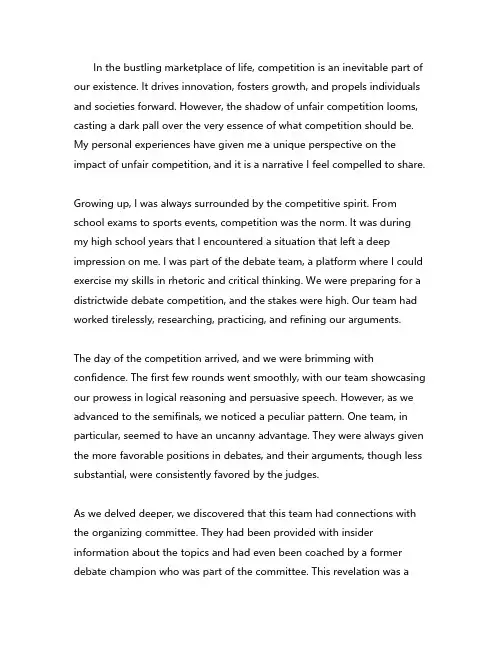
In the bustling marketplace of life, competition is an inevitable part of our existence. It drives innovation, fosters growth, and propels individuals and societies forward. However, the shadow of unfair competition looms, casting a dark pall over the very essence of what competition should be. My personal experiences have given me a unique perspective on the impact of unfair competition, and it is a narrative I feel compelled to share.Growing up, I was always surrounded by the competitive spirit. From school exams to sports events, competition was the norm. It was during my high school years that I encountered a situation that left a deep impression on me. I was part of the debate team, a platform where I could exercise my skills in rhetoric and critical thinking. We were preparing for a districtwide debate competition, and the stakes were high. Our team had worked tirelessly, researching, practicing, and refining our arguments.The day of the competition arrived, and we were brimming with confidence. The first few rounds went smoothly, with our team showcasing our prowess in logical reasoning and persuasive speech. However, as we advanced to the semifinals, we noticed a peculiar pattern. One team, in particular, seemed to have an uncanny advantage. They were always given the more favorable positions in debates, and their arguments, though less substantial, were consistently favored by the judges.As we delved deeper, we discovered that this team had connections with the organizing committee. They had been provided with insider information about the topics and had even been coached by a former debate champion who was part of the committee. This revelation was ashock to us. It felt as if all our hard work and dedication had been rendered futile by the shadow of favoritism and bias.The unfair competition didnt just affect us it tainted the entire event. The spirit of fair play, the very heart of any competition, was compromised. It was disheartening to see that merit was overshadowed by connections and manipulation. This experience was a stark reminder of the pervasive nature of unfair competition in various facets of life.Unfair competition can manifest in many forms, from corporate sabotage to academic dishonesty. A recent study highlighted that over 70% of employees have witnessed or experienced some form of unfair competition in the workplace. This could range from colleagues taking credit for others work to companies engaging in unethical practices to gain an edge over competitors.Moreover, the consequences of unfair competition are farreaching. It undermines the integrity of the competitive environment, discourages innovation, and breeds resentment among participants. It also perpetuates a culture of dishonesty and mistrust, which can have longterm implications for societal values and norms.To counteract this, it is crucial to foster a culture of transparency, accountability, and fairness. Educational institutions, workplaces, and sports organizations must establish and enforce strict codes of conduct to ensure a level playing field for all participants. Encouraging open communication and providing channels for reporting unfair practices canalso help in identifying and addressing issues of unfair competition.Furthermore, it is essential to educate individuals about the value of fair competition and the detrimental effects of unfair practices. This can be achieved through workshops, seminars, and awareness campaigns that emphasize the importance of integrity, honesty, and respect in competitive environments.In conclusion, unfair competition is a scourge that erodes the very foundation of our competitive spirit. It is a challenge that we must collectively address to preserve the sanctity of competition and ensure that it remains a catalyst for growth and progress. My personal encounter with unfair competition has been an eyeopener, and it has instilled in me a strong resolve to advocate for fairness and justice in all competitive endeavors.。
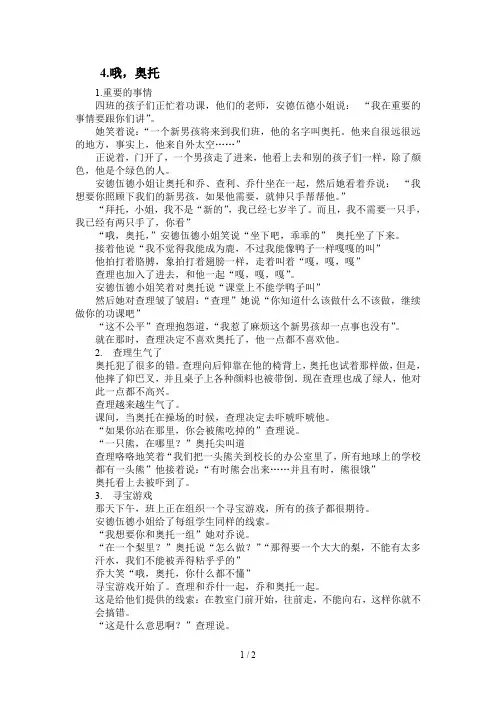
4.哦,奥托1.重要的事情四班的孩子们正忙着功课,他们的老师,安德伍德小姐说:“我在重要的事情要跟你们讲”。
她笑着说:“一个新男孩将来到我们班,他的名字叫奥托。
他来自很远很远的地方,事实上,他来自外太空……”正说着,门开了,一个男孩走了进来,他看上去和别的孩子们一样,除了颜色,他是个绿色的人。
安德伍德小姐让奥托和乔、查利、乔什坐在一起,然后她看着乔说:“我想要你照顾下我们的新男孩,如果他需要,就伸只手帮帮他。
”“拜托,小姐,我不是“新的”,我已经七岁半了。
而且,我不需要一只手,我已经有两只手了,你看”“哦,奥托,”安德伍德小姐笑说“坐下吧,乖乖的”奥托坐了下来。
接着他说“我不觉得我能成为鹿,不过我能像鸭子一样嘎嘎的叫”他拍打着胳膊,象拍打着翅膀一样,走着叫着“嘎,嘎,嘎”查理也加入了进去,和他一起“嘎,嘎,嘎”。
安德伍德小姐笑着对奥托说“课堂上不能学鸭子叫”然后她对查理皱了皱眉:“查理”她说“你知道什么该做什么不该做,继续做你的功课吧”“这不公平”查理抱怨道,“我惹了麻烦这个新男孩却一点事也没有”。
就在那时,查理决定不喜欢奥托了,他一点都不喜欢他。
2.查理生气了奥托犯了很多的错。
查理向后仰靠在他的椅背上,奥托也试着那样做,但是,他摔了仰巴叉,并且桌子上各种颜料也被带倒。
现在查理也成了绿人,他对此一点都不高兴。
查理越来越生气了。
课间,当奥托在操场的时候,查理决定去吓唬吓唬他。
“如果你站在那里,你会被熊吃掉的”查理说。
“一只熊,在哪里?”奥托尖叫道查理咯咯地笑着“我们把一头熊关到校长的办公室里了,所有地球上的学校都有一头熊”他接着说:“有时熊会出来……并且有时,熊很饿”奥托看上去被吓到了。
3.寻宝游戏那天下午,班上正在组织一个寻宝游戏,所有的孩子都很期待。
安德伍德小姐给了每组学生同样的线索。
“我想要你和奥托一组”她对乔说。
“在一个梨里?”奥托说“怎么做?”“那得要一个大大的梨,不能有太多汗水,我们不能被弄得粘乎乎的”乔大笑“哦,奥托,你什么都不懂”寻宝游戏开始了。
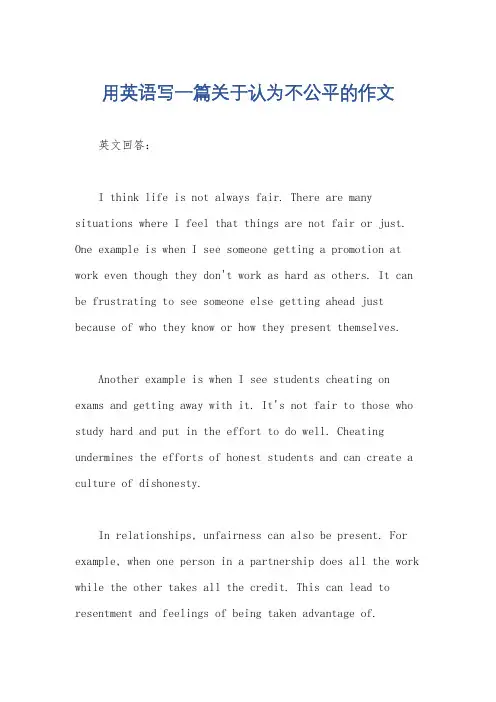
用英语写一篇关于认为不公平的作文英文回答:I think life is not always fair. There are many situations where I feel that things are not fair or just. One example is when I see someone getting a promotion at work even though they don't work as hard as others. It can be frustrating to see someone else getting ahead just because of who they know or how they present themselves.Another example is when I see students cheating on exams and getting away with it. It's not fair to those who study hard and put in the effort to do well. Cheating undermines the efforts of honest students and can create a culture of dishonesty.In relationships, unfairness can also be present. For example, when one person in a partnership does all the work while the other takes all the credit. This can lead to resentment and feelings of being taken advantage of.Overall, life is full of unfair situations that can be difficult to accept. It's important to remember that we can't control everything, but we can control how we react to these situations and strive to create a more fair and just world.中文回答:我认为生活并不总是公平的。
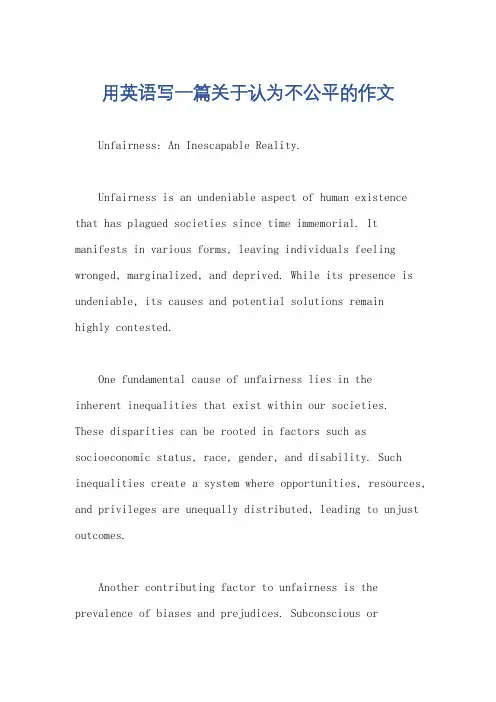
用英语写一篇关于认为不公平的作文Unfairness: An Inescapable Reality.Unfairness is an undeniable aspect of human existence that has plagued societies since time immemorial. It manifests in various forms, leaving individuals feeling wronged, marginalized, and deprived. While its presence is undeniable, its causes and potential solutions remainhighly contested.One fundamental cause of unfairness lies in theinherent inequalities that exist within our societies. These disparities can be rooted in factors such as socioeconomic status, race, gender, and disability. Such inequalities create a system where opportunities, resources, and privileges are unequally distributed, leading to unjust outcomes.Another contributing factor to unfairness is the prevalence of biases and prejudices. Subconscious orconscious biases can influence decision-making processes, resulting in discriminatory treatment towards certain individuals or groups. These biases can be deeply ingrained in our social fabric, making them difficult to identify and address.Unfairness can have profound consequences onindividuals and society as a whole. It can lead to feelings of anger, resentment, and disillusionment. It can also contribute to social unrest and conflict, undermining trust and cohesiveness within communities. Moreover, unfairness can perpetuate cycles of disadvantage, making it difficult for those who are already marginalized to break free from their circumstances.Addressing unfairness requires a multifaceted approach. It necessitates challenging and dismantling the systemic inequalities that create unfair outcomes. This involves implementing policies that promote equity, equality, and inclusion. It also requires addressing the biases and prejudices that perpetuate discrimination and fostering a culture of respect and understanding.Ultimately, overcoming unfairness is an ongoing and collective endeavor that requires the active participationof all members of society. It demands that we critically examine our own biases, challenge social norms, andadvocate for justice and fairness for all. While it may not be possible to eliminate unfairness entirely, we can strive to mitigate its impact and create a more equitable and just world.中文回答:不公平,一个无法逃避的现实。
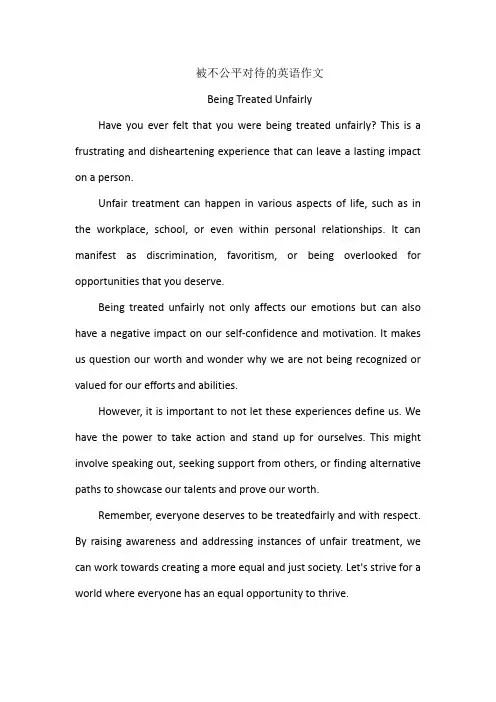
被不公平对待的英语作文Being Treated UnfairlyHave you ever felt that you were being treated unfairly? This is a frustrating and disheartening experience that can leave a lasting impact on a person.Unfair treatment can happen in various aspects of life, such as in the workplace, school, or even within personal relationships. It can manifest as discrimination, favoritism, or being overlooked for opportunities that you deserve.Being treated unfairly not only affects our emotions but can also have a negative impact on our self-confidence and motivation. It makes us question our worth and wonder why we are not being recognized or valued for our efforts and abilities.However, it is important to not let these experiences define us. We have the power to take action and stand up for ourselves. This might involve speaking out, seeking support from others, or finding alternative paths to showcase our talents and prove our worth.Remember, everyone deserves to be treatedfairly and with respect. By raising awareness and addressing instances of unfair treatment, we can work towards creating a more equal and just society. Let's strive for a world where everyone has an equal opportunity to thrive.。
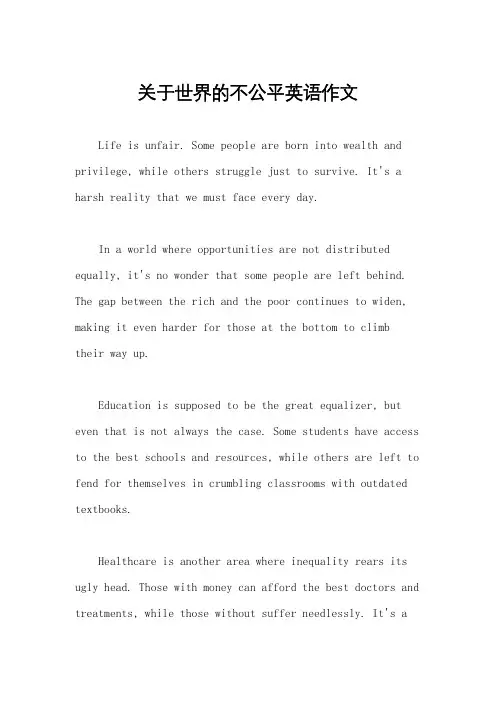
关于世界的不公平英语作文Life is unfair. Some people are born into wealth and privilege, while others struggle just to survive. It's a harsh reality that we must face every day.In a world where opportunities are not distributed equally, it's no wonder that some people are left behind. The gap between the rich and the poor continues to widen, making it even harder for those at the bottom to climbtheir way up.Education is supposed to be the great equalizer, but even that is not always the case. Some students have access to the best schools and resources, while others are left to fend for themselves in crumbling classrooms with outdated textbooks.Healthcare is another area where inequality rears its ugly head. Those with money can afford the best doctors and treatments, while those without suffer needlessly. It's acruel irony that the most vulnerable are often the ones who are forgotten.Injustice is everywhere we look, from the workplace to the criminal justice system. Discrimination based on race, gender, or socioeconomic status is rampant, leaving many feeling powerless and marginalized.But despite all the unfairness in the world, there is still hope. People are coming together to fight forequality and justice, to stand up for those who have been silenced and oppressed. It may be an uphill battle, butit's a fight worth fighting.。
用英语写一篇关于不公平的规矩作文Well, it's just not fair. I mean, there are these rules out there that just don't make sense. Like, why is it okay for some kids to get extra time on tests while others don't? It's not like they're working harder or smarter, they just have more time. That's not equality.And then you have these workplaces where the older employees get all the perks. They get to leave early, they get better benefits, and they don't have to work as hard.It's like they're being rewarded for being around longer, not for their actual performance. That's just not right.Or take this one: why are some sports teams allowed to have more practice time than others? It's not like they're any better or more skilled, they just get to train more.It's not a fair competition when one team has an unfair advantage.And let's not forget about the whole "dress code" thing.Why is it okay for some people to wear whatever they want while others have to abide by strict rules? It's like we're all supposed to look the same and conform to some outdated standards. That's just not fair to our individuality.So yeah, these unfair rules are just not cool. Theydon't make sense, they're not just, and they definitelydon't promote equality. It's like we're all playing by different rules, and that's just not fair.。
英语作文关于不公平Unfairness: A Pervasive Challenge in Our SocietyUnfairness is a pervasive issue that plagues our society, manifesting itself in various forms and affecting individuals from all walks of life. Whether it's in the workplace, the education system, or the justice system, the lack of fairness and equality can have profound and lasting consequences on the lives of those who experience it. In this essay, we will delve into the various facets of unfairness and explore its impact on our society.One of the most prevalent forms of unfairness is discrimination, where individuals are treated unequally based on their race, gender, age, or other personal characteristics. This can be seen in the hiring practices of some organizations, where qualified candidates are passed over for positions simply because they do not fit the desired profile. Similarly, in the education system, students from underprivileged backgrounds may face significant barriers to accessing quality education, limiting their opportunities for academic and personal growth.The consequences of such discrimination can be devastating, leadingto a perpetuation of social and economic inequalities. Individuals who are denied equal opportunities are often trapped in a cycle of poverty and limited prospects, unable to break free and achieve their full potential. This not only harms the individuals affected but also undermines the overall well-being and prosperity of our society.Another aspect of unfairness is the unequal distribution of resources and opportunities. In many communities, certain groups have access to better healthcare, infrastructure, and educational resources, while others are left behind. This disparity can be particularly pronounced in developing countries, where the gap between the wealthy and the impoverished is often staggering.The effects of this unequal distribution of resources can be far-reaching. Individuals living in underserved communities may have limited access to essential services, such as healthcare and education, which can have a detrimental impact on their overall well-being and future prospects. This, in turn, can perpetuate a cycle of poverty and disadvantage, making it increasingly difficult for these communities to break free and achieve social and economic mobility.Unfairness can also manifest in the justice system, where individuals from marginalized communities may face harsher treatment and disproportionate punishment. This can be seen in the disproportionate incarceration rates of certain racial and ethnicgroups, as well as in the disparities in sentencing for similar crimes. Such inequities within the justice system not only undermine the principles of fairness and equality but also erode public trust in the institutions that are meant to uphold the law.The consequences of such unfairness in the justice system can befar-reaching, affecting not only the individuals directly involved but also their families and communities. Individuals who are unjustly incarcerated may face significant challenges in reintegrating into society, finding employment, and rebuilding their lives. This, in turn, can have a ripple effect on their families and communities, perpetuating a cycle of disadvantage and social instability.In addition to the above-mentioned forms of unfairness, there are also more subtle and pervasive manifestations of inequality that can be difficult to identify and address. This can include biases and prejudices that are deeply ingrained in our social and cultural norms, as well as systemic barriers that limit the opportunities available to certain groups.For example, the lack of diversity and representation in positions of power and decision-making can perpetuate the dominance of certain groups and marginalize the voices of others. This can lead to the perpetuation of policies and practices that further entrench existing inequalities, making it increasingly difficult for individuals fromunderrepresented groups to break free and achieve success.To address the issue of unfairness, it is essential that we as a society take a multifaceted approach. This includes implementing policies and initiatives that promote equality, diversity, and inclusion, as well as addressing the root causes of discrimination and inequality. It also requires a concerted effort to educate and raise awareness about the pervasive nature of unfairness and its impact on individuals and communities.One key aspect of this approach is the need for greater accountability and transparency within our institutions and systems. This means ensuring that decision-making processes are fair and equitable, and that individuals and organizations are held responsible for any actions or policies that perpetuate unfairness and inequality.Additionally, it is crucial that we empower and amplify the voices of those who have been marginalized and denied equal opportunities. This can involve supporting grassroots movements and advocacy groups, as well as creating platforms for individuals to share their stories and experiences of unfairness.By taking a comprehensive and collaborative approach to addressing the issue of unfairness, we can work towards a more just andequitable society. This will not only benefit those who have been directly affected by unfairness but also strengthen the overall fabric of our communities and contribute to the greater good of humanity.In conclusion, unfairness is a complex and multifaceted issue that permeates our society, manifesting in various forms and affecting individuals and communities in profound ways. By acknowledging the pervasiveness of this challenge and taking concerted action to address it, we can work towards a more just, equitable, and inclusive world – one that truly embodies the principles of fairness and equality for all.。
用英语写一篇关于认为不公平的作文全文共3篇示例,供读者参考篇1An Unfair Policy That Needs to ChangeI'm sure we've all experienced situations in life that just didn't seem fair. As a student, I've encountered quite a few of these "unfair" policies and practices over the years. However, there's one in particular that really gets under my skin and needs to be addressed – the strict enforcement of dress codes in schools.Now, I totally get that schools need to have some basic guidelines when it comes to what students wear. You don't want people strolling into algebra class looking like they just rolled out of bed or stepped off a beach. It presents a poor image and can be distracting. However, the implementation of many dress codes has become extreme and discriminatory.The main issue I have is with how these policies are selectively enforced, primarily targeting female students. How many times have we seen girls getting dress-coded and sent home for minor violations like showing their shoulders orwearing shorts/skirts that are deemed "too short"? Yet, there are plenty of male students who wear sagging pants, exposing their boxers, or inappropriate t-shirts, but they rarely face any consequences.This unequal treatment sends the wrong message. It perpetuates the notion that girls' bodies are inherently sexual or distracting, placing the burden on them to cover up rather than teaching boys to be respectful. It's a form of body shaming and slut shaming that can severely impact young girls' self-esteem and make them feel ashamed of their natural development.Furthermore, who gets to decide what's considered "too short" or "too revealing"? These are highly subjective criteria that are often based on antiquated, sexist ideas of modesty. Just because a teacher or administrator finds something disagreeable doesn't make it a legitimate violation worthy of disciplinary action.I've witnessed friends get dress-coded for wearing a tank top on a hot day, or shorts that were longer than their fingertips (the supposed measurement standard). Yet there's no clearly defined limit on how much shoulder or leg can be exposed before it crosses some arbitrary line. It's infuriating to have to strategically pick outfits for fear of being targeted.There's also a significant cultural bias within many dress codes. While they claim to be promoting professionalism, the accepted definition of "professional" attire is rooted in Western, Eurocentric traditions. Students from diverse backgrounds may have differing cultural norms around clothing that aren't respected or accommodated. We've seen instances of girls being penalized for wearing religious head coverings or cultural hairstyles that don't align with these narrow ideals.This lack of cultural awareness and sensitivity essentially forces minority students to choose between adhering to discriminatory policies or being punished for expressing their identities. That's completely unacceptable in a society that prides itself on values like diversity and inclusion.The consequences of violating dress codes are also excessive and disruptive to students' education. Rather than a simple warning, many schools will immediately send kids home until they can remedy the violation, missing crucial class time as a result. This disproportionately impacts students fromlow-income families who may not have access to backup clothing or means of transportation to retrieve different outfits. It creates an unfair disadvantage that exacerbates existing systemic inequalities.There's also the humiliating "shaming" aspect where students are often publicly dress-coded in front of their peers. Having a teacher or administrator scrutinize your body and deem your outfit inappropriate is both uncomfortable and demoralizing, especially during the already turbulent adolescent years. This sense of embarrassment can lead to negative body image issues, low self-esteem, and alienation from school altogether.At the end of the day, these extreme dress code policies do more harm than good. Rather than fostering a positive, inclusive learning environment, they promote discrimination, sexism, cultural insensitivity, and shaming. There's a fundamental lack of respect for students' rights, identities, and developmental needs.I'm not suggesting we do away with all dress codes - having some basic, universal guidelines around wearing offensive imagery/slogans or ensuring health and safety regulations are met is reasonable. However, these policies need to be reworked from the ground up with input from students, parents, and cultural representatives to eliminate bias and subjectivity.The focus should shift towards promoting studentself-governance, body positivity, and mutual respect instead of defaulting to punitive, controlling measures. More educationalprograms could teach the importance of self-expression balanced with situational awareness. Simple advisories like "classroom attire" versus "lunchtime attire" provide enough guidance without being unnecessarily restrictive.Overall, students shouldn't have to sacrifice their identities, comfort, and freedoms at school. These years are already challenging enough without篇2An Unjust World: A Student's Perspective on UnfairnessAs a student, I've come to realize that the world we live in is rife with unfairness. It's a harsh reality that has become increasingly apparent to me as I've grown older and more aware of the injustices that pervade our society. From the momentwe're born, it seems that the deck is stacked against some of us, while others are dealt a far more favorable hand.One of the most glaring examples of unfairness that I've encountered is the stark divide between the haves and the have-nots. It's a chasm that stretches across all aspects of life, from education to healthcare, housing, and beyond. For those born into poverty, the odds of escaping that cycle are oftenstaggeringly low, no matter how hard they work or how much they dream.In contrast, those born into wealth and privilege enjoy a head start that can't be denied. They have access to the best schools, the best healthcare, and the best opportunities from the outset. It's a cruel irony that those who need the least assistance often receive the most, while those who need the most support are left to fend for themselves.As a student, I've witnessed this unfairness firsthand in the realm of education. I've seen classmates from affluent families breeze through their studies, aided by private tutors, enrichment programs, and a host of other resources that their parents can afford. Meanwhile, my peers from less fortunate backgrounds struggle to keep up, burdened by the need to work part-time jobs, juggle family responsibilities, and make do with limited resources.It's a sobering reality that one's zip code can often dictate the quality of education they receive. Schools in wealthier districts are well-funded, boasting state-of-the-art facilities, experienced teachers, and a diverse array of extracurricular activities. In contrast, schools in poorer neighborhoods arefrequently underfunded, overcrowded, and lacking in vital resources.This disparity in educational opportunities perpetuates a vicious cycle, where those who start off disadvantaged are robbed of the tools they need to break free from the shackles of poverty. It's a cruel and unjust system that robs so many bright and talented individuals of the chance to realize their full potential.But unfairness extends far beyond the realm of education. It's a pervasive force that permeates every aspect of our society, from the job market to the criminal justice system. Studies have shown that individuals with ethnic-sounding names are less likely to be called back for job interviews, even when their qualifications are identical to those with more traditionally Western names.And within the criminal justice system, the scales of justice seem to be tipped in favor of the wealthy and privileged, while those from disadvantaged backgrounds often face harsher sentences for the same crimes. It's a system that perpetuates the cycle of inequality, robbing countless individuals of their freedom and their futures.Perhaps most disheartening of all is the unfairness that stems from our very biology. Some of us are born with disabilities or chronic illnesses that impose limitations and challenges from the outset. Others are blessed with robust health and able bodies. It's a cruel lottery of fate that no one can control, yet it can have a profound impact on the trajectory of our lives.As a student, I've seen this unfairness play out in the classroom, where those with learning disabilities or physical challenges often face an uphill battle, struggling to keep pace with their peers. It's a heartbreaking reality that highlights the inherent injustice of a world that fails to accommodate and support those who need it most.And yet, despite the overwhelming evidence of unfairness that surrounds us, there are those who would deny its existence. They cling to the myth of meritocracy, asserting that if we just work hard enough, we can overcome any obstacle. But this rhetoric fails to acknowledge the systemic barriers and institutional biases that stack the odds against so many.It's a convenient narrative for those who have benefited from privilege, allowing them to rationalize their success as theproduct of their own hard work, rather than acknowledging the head start they were given by virtue of their circumstances.But for those of us who have witnessed the harsh realities of unfairness firsthand, such platitudes ring hollow. We know that hard work alone is often not enough to overcome thedeep-seated inequalities that pervade our society.So, what can be done to address this pervasive unfairness? The solutions are complex and multifaceted, but they must begin with acknowledgment and awareness. We must shine a light on the injustices that have been allowed to fester for far too long, and we must commit ourselves to creating a more equitable and just world.This means investing in quality education for all, regardless of zip code or socioeconomic status. It means reforming our criminal justice system to ensure that justice is truly blind, and that no one is punished more harshly simply because of their background or circumstances.It means dismantling the institutional biases and systemic barriers that have held so many back, and creating a level playing field where everyone has a fair shot at success.And perhaps most importantly, it means fostering a culture of empathy and compassion, where we recognize that none of us are solely responsible for the circumstances into which we were born. We must reject the notion that poverty or disadvantage is a personal failing, and instead embrace the understanding that we are all part of a larger tapestry, woven together by the threads of our shared humanity.Only then can we begin to weave a new narrative, one that recognizes the inherent worth and potential of every individual, regardless of their background or circumstances. It's a lofty goal, but one that is worth striving towards, for the sake of creating a more just and equitable world for all.As a student, I may be young and my voice may be small, but I refuse to remain silent in the face of such pervasive unfairness. I will use my education as a tool to amplify the voices of those who have been silenced for too long, and I will dedicate myself to the pursuit of justice and equality.For in a world that often seems stacked against us, the only true path forward is to come together and demand better. To insist on a society where merit and hard work are rewarded, but where no one is left behind simply because of the circumstances into which they were born.It's a tall order, but one that we must embrace if we are to create a world worthy of our highest ideals. A world where unfairness is not the norm, but a relic of a darker past, banished by the collective will of those who dared to dream of a more just and equitable future.篇3An Unfair OrdealI was just an ordinary high school student, looking forward to graduating and moving on to college. My life took an unexpected and incredibly unfair turn last year that I'm still trying to make sense of. This is my story.It all started with a group project in my English class. We had to write a research paper on a novel we were studying. I was paired up with three other students - Sam, Alex, and Riley. We divided up the work and set deadlines for getting our sections done.I did my part, putting a lot of time and effort into summarizing and analyzing two key chapters. Sam and Alex also turned in their sections on time. However, Riley didn't submit anything, saying he had been dealing with family issues.Our teacher, Mrs. Thompson, told us we should try to work it out among ourselves first before she intervened. After a few days of Riley not responding to our messages, we had no choice but to notify Mrs. Thompson that one group member had not contributed.Rather than dealing with it privately and giving Riley a chance to explain himself, Mrs. Thompson made an example out of our group in front of the entire class. She accused us of being unable to work together and letting "petty conflicts" get in the way of the project.We tried to explain that it was just Riley who had dropped the ball, not the rest of us. But Mrs. Thompson insisted that since it was a group project, we all deserved to be punished. She gave our entire group a failing grade on the assignment, which made up 25% of our final English grade.I could not believe what was happening. How could we all be punished so severely for something that was clearly out of our control? I had done my part, as had Sam and Alex. It was completely unfair to fail us because of Riley's lack of responsibility.After class, my friends and I pleaded with Mrs. Thompson to reconsider, explaining that failing us would severely impact ourGPAs and chances of getting into good colleges. She would not budge, saying we should have handled it better as a group.My parents got involved, requesting a meeting with Mrs. Thompson and the principal. But it was no use - they took the teacher's side completely. The failing grade stood for all of us, regardless of who was actually at fault.I had always been a good student who worked hard and followed the rules. Now I was being punished for somebody else's irresponsibility through no fault of my own. It felt like such a kick in the gut after years of effort.This unjust situation caused me so much stress and lost sleep, knowing my future prospects were jeopardized over something I had made every effort to prevent. My friends were in the same boat. We avoided Riley at all costs after that, feeling he had sabotaged our academic success without a shred of remorse.As the year went on, my hatred toward Mrs. Thompson and the administration grew. Their stubborn refusal to see reason and correct this blatant act of unfairness was appalling to me. It dramatically shook my respect for authority and trust in the system.I tried my best to pull my English grade up through other assignments, but the damage was done. That failing project grade dragged down my final mark significantly. When applying to colleges, I had to answer questions about that grade and explain the circumstances around it, which made me re-live the frustration all over again.While I was fortunate enough to get into a good college despite that black mark on my record, I know this unfair event may have cost me opportunities. It could potentially impact my future career, all because I was wrongly accused and punished by people who let power go to their heads.Looking back, I realize how unfortunate it was that Mrs. Thompson took such a hardline, unjust stance. If she had just listened to us instead of making assumptions, she could have separated the wrongdoer from those of us who acted in good faith. With a little fairness and wisdom on her part, this whole stressful saga could have been avoided.This experience taught me that authority figures are not infallible, and blindly following unjust rules is a recipe for compounding the unfairness. I vowed to always fight for what is right and never kick people when they are down if I attain aposition of power someday. A little objectivity and fair judgment can go a long way.While I'm trying to move forward, this unfair event still stings years later. It opened my eyes to how easy it can be for an innocent person to get swept up in an unjust system that refuses to correct its mistakes. I'll never forget that difficult lesson about making sure all voices are heard before punishing the good along with the bad.。
不公正的批评英文作文下载温馨提示:该文档是我店铺精心编制而成,希望大家下载以后,能够帮助大家解决实际的问题。
文档下载后可定制随意修改,请根据实际需要进行相应的调整和使用,谢谢!并且,本店铺为大家提供各种各样类型的实用资料,如教育随笔、日记赏析、句子摘抄、古诗大全、经典美文、话题作文、工作总结、词语解析、文案摘录、其他资料等等,如想了解不同资料格式和写法,敬请关注!Download tips: This document is carefully compiled by theeditor. I hope that after you download them,they can help yousolve practical problems. The document can be customized andmodified after downloading,please adjust and use it according toactual needs, thank you!In addition, our shop provides you with various types ofpractical materials,such as educational essays, diaryappreciation,sentence excerpts,ancient poems,classic articles,topic composition,work summary,word parsing,copyexcerpts,other materials and so on,want to know different data formats andwriting methods,please pay attention!Criticism is a part of life. It can be constructive and helpful, but it can also be unfair and hurtful. Unjust criticism can come from various sources, such as peers, family members, or even strangers. It is important to address this issue and understand the impact it can have on individuals.Criticism can sometimes be like a punch in the gut. It catches you off guard and leaves you feeling vulnerable. It can make you doubt your abilities and question your self-worth. Unfair criticism often lacks any constructive feedback or suggestions for improvement. It is simply meant to tear you down and make you feel small.When faced with unjust criticism, it can be tempting to retaliate or defend yourself. However, it is important to remember that not all battles are worth fighting. Sometimes, it is best to let the words slide off your back and focuson your own growth and happiness. After all, you cannotcontrol how others perceive you or what they say about you.Unfair criticism can also come in the form of gossip. People may spread rumors or make false accusations without any evidence or basis. This can be especially damaging in a society where reputation is highly valued. It can tarnish your image and make it difficult to regain trust and respect from others.It is crucial to surround yourself with a supportive network of friends and family who can lift you up in times of unfair criticism. They can provide a safe space for you to express your feelings and offer guidance and encouragement. Remember, you are not alone in facing these challenges, and there are people who genuinely care about your well-being.In the face of unfair criticism, it is important to maintain your self-confidence and belief in your own abilities. Remind yourself of your accomplishments and strengths. Focus on personal growth and self-improvement rather than seeking validation from others. At the end ofthe day, it is your own opinion of yourself that matters the most.Unjust criticism can be hurtful and damaging, but it does not define who you are as a person. It is crucial to rise above it and not let it consume you. Surround yourself with positivity, focus on your own growth, and rememberthat you are worthy of love and respect, regardless of what others may say.。
英语故事翻译:这是不公平It’s UnfairIt’s UnfairLinda was a good girl, but she was often late for school.One day, she was late again. When she came in, Mr. Clark, her teacher said angrily, “I’ll tell you father if you are late again.” Linda didn’t want him to do that. Because her father was very strict with her.The next morning, Linda got up early. She hurried to school. At the school gate, she heard the first bell, “What shall I do?” she asked herself, “I’ll turn it in first.” She decided. And so she did.When she hurried into her classroom, Mr. Clack was already beginning his class.“Linda! Didn’t I tell you to be here on time?” Mr. Clack said as he as her.“I’m sorry, sir,” Linda tried to explain, “I’m late because I had to…?”“I don’t l isten to any excuse,” Mr. Clack stopped her. “If you can’t get here on time, I have to tell your father.”“But Mr. Clack. It’s …it’s unfair!”“Unfair! How dare you say that?” Mr. Clack said angrily, “I’ll report you to the headmaster.“I was only trying to do a good idea,” Linda thought,“and now…” She couldn’t keep back her tears.When the bell rang for the break, the door opened and Mr. White, the headmaster came in. he was holding a wallet in his hand, “Excuse me, Mr. Clack. Is this your w allet?”“Oh,yes. It’s my wallet. Who found it? I must thank him.”“Linda found it and turned it in before school started.” Mr. Whitesaid.Mr. Clack face slowly turned red. He looked at Linda and said, “I’m very sorry. Linda. I take back what I said.”“And I’m sorry. Mr. Clack. I’ll try not to be late again.” Linda said.这是不公平琳达是一个好女孩,但她经常迟到。
不公平英语作文Inequality is a pervasive issue that affects many aspects of our society, and the English language is no exception. The unfairness in English education can manifest in various ways, from the resources available to students to the expectations placed upon them.Firstly, the disparity in access to quality English education is evident. In some regions, students have access to well-equipped classrooms, experienced teachers, and a plethora of learning materials. However, in other areas, the situation is starkly different. Students may have to make do with outdated textbooks and limited opportunities for practice, which puts them at a disadvantage.Secondly, the expectations set for students can also be unfair. In some educational systems, the focus is heavily on achieving high scores on standardized tests. This can lead to a narrow view of what constitutes proficiency in English,often neglecting the importance of communication and creativity. Students who excel in these areas may not receive the recognition they deserve, while those who perform well on tests may be overpraised.Moreover, the cultural bias inherent in some English language curricula can be a source of unfairness. The content often reflects the culture and values of English-speaking countries, which may not resonate with students from diverse backgrounds.This can lead to a lack of engagement and a sense of alienation from the learning process.Additionally, the pressure to conform to a certain standard of English can be overwhelming for some students. The emphasis on native-like fluency can be discouraging for those who are learning English as a second language, as they may feel that they can never truly master it.To address these issues, it is crucial for educators to create an inclusive and equitable learning environment. This involves providing equal access to resources, settingrealistic and diverse expectations, and incorporating a variety of cultural perspectives into the curriculum. By doing so, we can help to level the playing field and ensure that all students have the opportunity to succeed in their English language studies.。
经典幼儿英语短文带翻译:这是不公平Linda was a good girl, but she was often late for school.
One day, she was late again. When she came in, Mr. Clark, her teacher said angrily, “I’ll tell you father if you are late again.” Linda didn’t want him to do that. Because her father was very strict with her.
The next morning, Linda got up early. She hurried to school. At the school gate, she heard the first bell, “What shall I do?” she asked herself, “I’ll turn it in first.” She decided. And so she did.
When she hurried into her classroom, Mr. Clack was
already beginning his class.
“Linda! Didn’t I tell you to be here on time?” Mr. Clack said as he as her.
“I’m sorry, sir,” Linda tried to explain, “I’m late because I had to…?”
“I don’t listen to any excuse,” Mr. Clac k stopped her. “If you can’t get here on time, I have to tell your father.”
“But Mr. Clack. It’s …it’s unfair!”
“Unfair! How dare you say that?” Mr. Clack said angrily, “I’ll report you to the headmaster.
“I was only trying to do a good idea,” Linda
thought,“and now…” She couldn’t keep back her tears.
When the bell rang for the break, the door opened and Mr. White, the headmaster came in. he was holding a wallet in his hand, “Excuse me, Mr. Clack. Is this your wallet?”
“Oh,yes. It’s my wallet. Who found it? I must thank him.”
“Linda found it and turned it in before school started.” Mr. Whitesaid.
Mr. Clack face slowly turned red. He looked at Linda and said, “I’m very sorry. Linda. I take back what I said.”
“And I’m sorry. Mr. Clack. I’ll try not to be late again.” Linda said.
这是不公平
琳达是一个好女孩,但她经常迟到。
一天,琳达又迟到了。
当她进来的时,她的老师克拉克先生生气说:“如果你在迟到,我就通知你爸爸。
”琳达不想他那么做,因为
她爸爸对她要求很严格。
二天,琳达起床很早。
她匆匆向学校走去,在学校大门口,她停
下来了。
因为地上有一个钱夹。
当她站在那儿是,她听见了第一遍铃
声,“我该怎么办呢?”她自言自语,“我要先把它交上去。
”她下
定决定,于是她就是这么做了。
当她匆匆走进教室的时候,克拉克先生已经开始讲课了。
“琳达,我没有告诉你早点来吗?”克拉克先生一看到琳达就说,
“对不起,先生。
”琳达想解释,“我迟到是因为我不得不……”
“我不想听任何借口,“克拉克阻止道, “如果你不能准时到这
儿,我不得不告诉你父亲。
”
“但是,克拉克先生,这是…..这是不公平的!”
“不公平!你怎么敢那么说!”克拉克先生愤怒的说,“我要把
你的事情汇报给校长!”
“我只想做一件好事,”琳达心想,“但是现在……”她的眼泪
阻止不住流下来。
当下课铃声响起是,教室的门开了,校长怀特先生走了进来。
他
的手里拿着一个钱夹:“打扰一下,克拉克先生,这是你的钱夹吗?”
“哦,是我的。
是谁找到的?我一定的谢谢她。
”
“琳达发现的,并在上课前把它交来了。
”怀特先生说。
克拉克先生的脸逐步红了,他看了看琳达,惭愧地说:“对不起,琳达,我收回我说过的话。
”
“我也不对,克拉克先生,我下次尽量不再迟到了。
”琳达说。